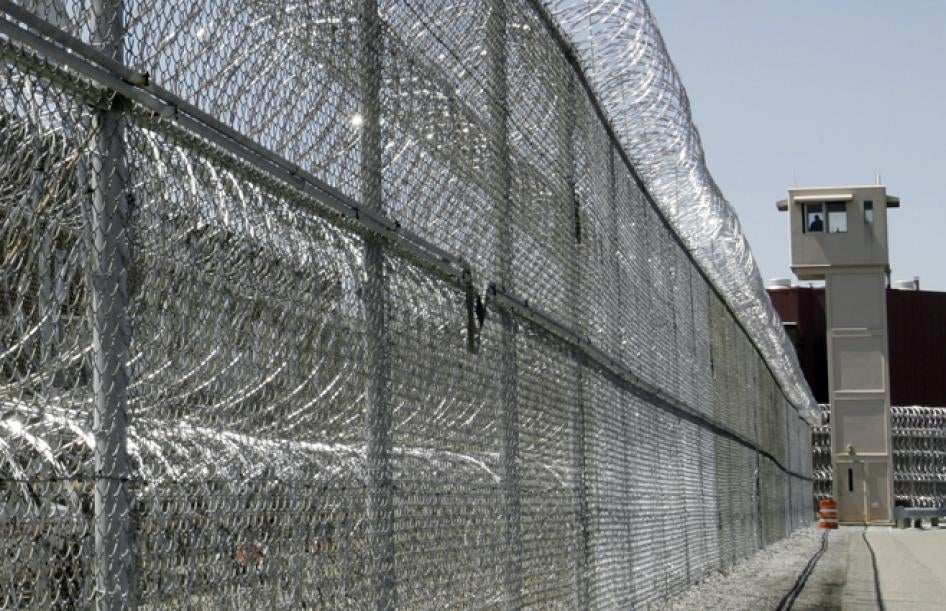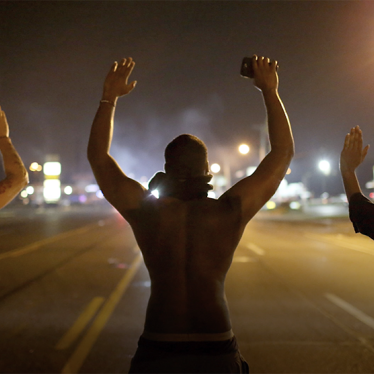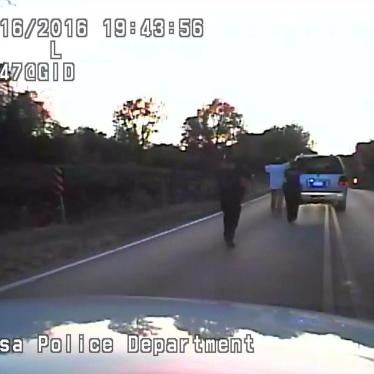|
Letter
Letter to Champaign County Sheriff's Office: Don't Expand Jail, Invest in Communities
Human Rights Watch Open Letter to Sheriff Dustin Heuerman
Champaign County Sheriff’s Office
204 East Main Street
Urbana, Illinois 61801
Sent by e-mail
January 8, 2019
Re: Proposed Jail Renovation
Human Rights Watch is an international non-profit organization dedicated to documenting and exposing human rights violations and advocating for accountability and reforms throughout the world.[1] Our US Program has found disregard for fundamental human rights in many aspects of the US criminal legal system.[2] One significant problem we have documented has been the resort to criminalization and jailing as a response to problems of poverty, homelessness, mental illness, and substance abuse.[3] We have found that this criminalization is most frequently and harmfully targeted at black and brown people, contributing to racial injustice throughout the country.[4]
We understand that the government of Champaign County, Illinois is considering shutting down an existing jail, but expanding and renovating another jail at considerable expense,[5] despite steadily decreasing jail populations in recent years.[6] Investing scarce public resources on jails, even supposedly “modernized” jails, redoubles this criminalization strategy and detracts from investment in community-based programs and economic development that more directly address societal problems that undermine public safety.[7]
The Champaign County Community Justice Task Force, in a 2013 report, recommended the county undertake a variety of initiatives that would reduce the need for jail beds and help keep people out of custody.[8] They recommended funding comprehensive re-entry programs for people returning from prison; mental health and drug treatment services; expanding options for sentences, including restorative justice programs that promote rehabilitation, reconciliation with victims, and actions in and for the community, over jailing, and reforming the pretrial system to reduce the rate of pretrial incarceration.[9] Implementing these types of programs would promote community safety without excessive reliance on jails and prisons.
In our recent report on policing in Tulsa, Oklahoma, we found, for example, that the city lacked adequate mental health services and support for a substantial population with mental health conditions. Instead, the city relied on police, often resulting in force, arrest and jailing. Advocates and even many within law enforcement realize that police are not necessarily the best response for people in crisis and that mental health should generally not be treated as a law enforcement issue, except in certain specific instances.[10] We called for improvement in the mental health system, instead of more law enforcement.[11]
The Community Justice Task Force similarly found that the large number of people in the Champaign County jail with serious mental health conditions was a substantial problem, resulting in suffering for those in need of treatment and support, but also draining staff resources and increasing likelihood of re-offense.[12] The report implied that Champaign County lacks sufficient mental health services and supports, recommending various interventions to reduce the number of people with serious mental health conditions placed in jail.[13] Human Rights Watch recommends investing in improving community support and care for people with mental health conditions, rather than jailing them.
Similarly, in documenting problems with the US criminal legal system for decades, we found that much crime results from poverty, homelessness, and substance abuse.[14] We recommend investment in community economic development programs, affordable housing, including housing with services, and community-based substance abuse treatment, rather than addressing these problems through policing and jailing.[15]
A large proportion of county jail populations, in general, are people incarcerated pretrial, mostly held because they cannot afford to pay bail. The Community Justice Task Force found that as many as 80 percent of Champaign County jail prisoners were being held pretrial.[16] Human Rights Watch has found that many pretrial incarceration practices were unfair, harmful and discriminatory towards poor people.[17] It is also largely unnecessary.[18] We have advocated for reforms in pretrial systems across the country, including in Illinois, that preserve the legal presumption of innocence by drastically lowering rates of pretrial incarceration.[19] County leaders should reconsider investing public money in a jail as the state of Illinois moves forward with pretrial reform that should lower jail populations.
Los Angeles County, California recently faced a decision similar to that which now confronts Champaign County. They have an aging jail that is considered unsafe; they have a large population of prisoners with mental health conditions and lack capacity to care for them.[20] However, Los Angeles chose not to build a new, modernized jail with specialized housing for people with mental health conditions. Instead, they chose to redirect that money into a comprehensive “alternatives to incarceration” approach, including considering how to invest in communities to provide services and meet needs without criminalization.[21] Los Angeles County provides a model for Champaign County to follow.
Governments should promote economic development and improve the availability of services, like affordable housing and mental health care and support for people returning from prison, that will address some of the root causes of crime, instead of making policing and jails the default response to so many societal problems. Human Rights Watch urges you to consider investing in communities instead of in jails.
[1] Human Rights Watch, https://www.hrw.org/.
[2] Human Rights Watch, US Program, https://www.hrw.org/united-states/criminal-justice.
[3] Human Rights Watch, “Get on the Ground!”: Policing, Poverty and Racial Inequality in Tulsa, Oklahoma, September 2019, https://www.hrw.org/report/2019/09/12/get-ground-policing-poverty-and-racial-inequality-tulsa-oklahoma/case-study-us-law; Human Rights Watch, “Not in it for Justice” How California’s Pretrial Detention and Bail System Unfairly Punishes Poor People, April 2017, https://www.hrw.org/report/2017/04/11/not-it-justice/how-californias-pretrial-detention-and-bail-system-unfairly; Human Rights Watch, Every 25 Seconds: The Human Toll of Criminalizing Drug Use in the United States, September 2016, https://www.hrw.org/report/2016/10/12/every-25-seconds/human-toll-criminalizing-drug-use-united-states.
[4] Ibid.; see also, Human Rights Watch, Targeting Blacks: Drug Law Enforcement and Race in the United States, May 2008, https://www.hrw.org/reports/2008/us0508/.
[5] Jim Meadows, “County Board Views Jail Consolidation Plan, and Worries About the Cost,” iwillradio.tv.online, Illinois Public Media, October 25, 2019, https://will.illinois.edu/news/story/county-board-views-jail-consolidation-plan-and-worries-about-the-cost.
[6] See chart prepared by Dottie Vura Weis, on file with Human Rights Watch.
[7] Human Rights Watch, “Get on the Ground!”, pp. 200-203; Build Programs Not Jails, “No New Jail Cells in Champaign County,” https://programsnotjails.com/no-new-jail-cells-in-champaign-county/.
[9] Ibid.
[11] Human Rights Watch, “Get on the Ground!”, pp. 144-150.
[12]Recommendations, Champaign County Community Justice Task Force, pp. 10-11.
[13] Ibid.
[14] See Human Rights Watch, Every 25 Seconds; Human Rights Watch, A Nation Behind Bars; A Human Rights Solution, May 6, 2014, https://www.hrw.org/news/2014/05/06/us-nation-behind-bars; Human Rights Watch, No Second Chance: People with Criminal Records Denied Access to Public Housing, November 18, 2004, https://www.hrw.org/report/2004/11/18/no-second-chance/people-criminal-records-denied-access-public-housing.
[15] John Raphling, “Being homeless is not a crime,” The Hill, December 27, 2019, https://thehill.com/opinion/civil-rights/475803-being-homeless-is-not-a-crime.
[16] Recommendations, Champaign County Community Justice Task Force, at pp. 8-9.
[17] Human Rights Watch, “Q & A: Pretrial Incarceration, Bail and Profile Based Risk Assessment in the United States,” June 1, 2018, https://www.hrw.org/news/2018/06/01/q-pretrial-incarceration-bail-and-profile-based-risk-assessment-united-states.
[18] Aurelie Ouss and Megan T. Stevenson, “Evaluating Impacts of Eliminating Prosecutorial Request for Cash Bail,” February 17, 2019, https://papers.ssrn.com/sol3/papers.cfm?abstract_id=3335138.
[19] Human Rights Watch, “Not in it for Justice,”; Letter from Human Rights Watch to Hon. Robbin J. Stuckert, Chair, Supreme Court Commission on Pretrial Practices, June 26, 2019 https://www.hrw.org/news/2019/06/26/submission-illinois-supreme-court-commission-pretrial-practices.
[20] Matt Stiles, “’No more jails,’ just mental health centers. Is that a realistic policy for L.A. County?”, Los Angeles Times, August 26, 2019, https://www.latimes.com/california/story/2019-08-24/jail-replacement-mental-health-facility-inmate-supervisors-criminal-justice-reform.
[21] Editorial Board, “2019 was the year L.A. County finally said ‘no’ to new jails,” Los Angeles Times, December 26, 2019, https://www.latimes.com/opinion/story/2019-12-26/jails-versus-alternatives-to-incarceration.
Your tax deductible gift can help stop human rights violations and save lives around the world.
Region / Country
Most Viewed
-
November 25, 2019
A Dirty Investment

-
June 3, 2025
“They’re Ruining People’s Lives”

-
December 21, 2023
Meta’s Broken Promises

-
January 25, 2024
“We’re Dying Here”

-
November 12, 2018
“Shall I Feed My Daughter, or Educate Her?”





